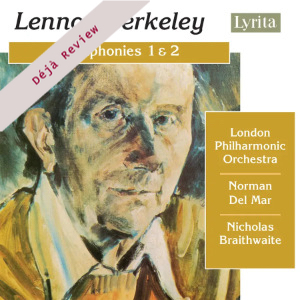
Déjà Review: this review was first published in July 2007 and the recording is still available.
Lennox Berkeley (1903-1989)
Symphony No. 1 (1940)
Symphony No. 2 (1956-57 rev. 1976)
London Philharmonic Orchestra/Norman Del Mar (No 1); Nicholas Braithwaite (No 2)
rec. 1975-76. ADD
Lyrita SRCD249 [62]
My only really good Lennox Berkeley story is perhaps worth repeating. I told a friend of mine that I had a nice chat with Michael Berkeley at a Housman weekend at Bromsgrove. I thought she would be impressed. She replied to me, “Oh I had dinner with Lennox.” That was the end of that conversation. Deflated, I resolved never to name-drop again!
I heard the First Symphony back in the mid-seventies when it was first released on Lyrita. I must confess that I was not impressed. I am not now too sure as to the reasons for this distaste – but I think it may have been to do with the fact that at that time I was besotted with Ralph Vaughan Williams – and Berkeley just did not have the pastoral touch! Over the years I have heard this work again and have revised my impression. I would not say that it was in my top ten symphonies but I have come to see it as a major essay in that particular form – with a particular significance.
The work’s genesis lies in the late 1930s however it was completed in 1940. The Symphony is obviously a ‘wartime’ work – at least as far as the dates are concerned. However when this work is compared to many ‘wartime’ symphonies we notice an interesting point.
Typically a composer could do four things. He could write music totally influenced by the horrors and stress of the times. Secondly he could allow the signs of the times to surface in his music. Thirdly he could compose idealistic music that looked beyond the strife and lastly he could ignore the conflict. In Britain there was no great demand for the first option. I guess that Vaughan Williams’ Fifth Symphony fulfils the third category. Certainly Goossens’ two ‘wartime’ essays ignore the historical moment. It is perhaps the second option that influenced most British composers. We need think of Armstrong Gibbs’ Odysseus or perhaps Arthur Benjamin’s Symphony.
Berkeley, however, managed a fine synthesis. There is elegance and wit in this work that on the one hand belies the historical situation – yet there are also turbulent passages that suggest a ‘reflection of wartime moods.’ The keynote of this work is emotional and stylistic balance.
The opening movement is in classical sonata-form with a good contrast between the first and second subjects. Fine writing for brass is one of the highlights.
Look out for the waltz-like ‘allegretto’ which is so typical of Berkeley. However it is with the ‘lento’ that we feel that the war is pressing in on this Symphony. This is deeply felt music that inspires as well as challenges. The last movement probably owes more to Haydn than any other composer. This is a fascinating little ‘rondo’ with more than a passing nod to the neo-classical Serenade for Strings.
The Second Symphony was composed in 1956/57 as a commission from the Feeney Trust; however it was considerably revised by the composer in 1976. It is this version that is recorded here. Apparently Berkeley had reservations about the scoring of the original work. He wrote that in 1956 he had been trying to keep the various orchestral colours discreet. He later came to the view that he had overdone this process and decided that the work needed ‘a freer and more robust treatment’. There was a certain amount of formal rework as well – passages were extended – but no new material was invented. I have never heard the original version as the Chandos recording also uses the revised score.
Interestingly the received wisdom seems to be that this is perhaps the most difficult of the Berkeley Symphonies to come to terms with. The reasons given for this are that it lacks the concentration and concision of the Third and that it is not as ‘expansive in conception as the … Fourth. I must beg to differ on this. The Second has been my favourite ever since I got over the fact that the composer was not writing in a pastoral vein. From the mysterious opening bars through to the energetic final coda the music is inventive and satisfying. The melodic invention, the bitter sweet harmonises and the idiosyncratic instrumentation all lend themselves to a fine work.
Lyrita has done well to re-release Lennox Berkeley’s first three Symphonies. I wonder if the archive has a recording of the Fourth? Chandos have recorded all four Symphonies and Richard Hickox has done a great service to Berkeley’s orchestral works.
It is impossible to say what version is ‘best’. However I would say that for me, the Lyrita disc does have the edge. It is probably because these are the recordings I came to know over the last thirty odd years.
John France
If you purchase this recording using a link below, it generates revenue for MWI and helps us maintain free access to the site



















